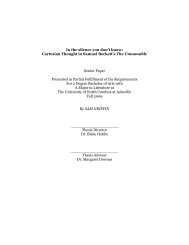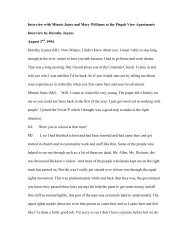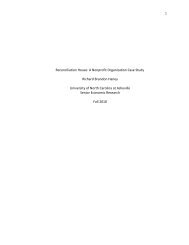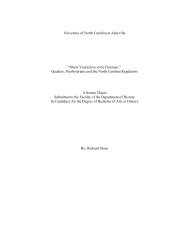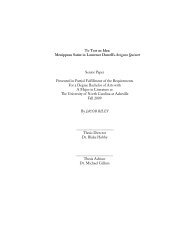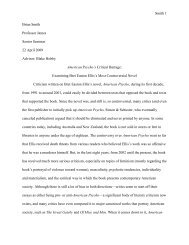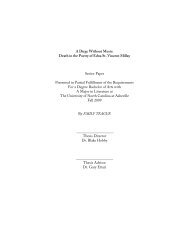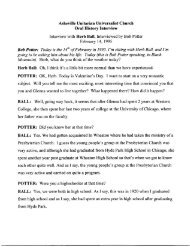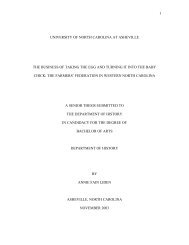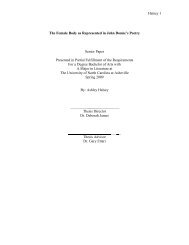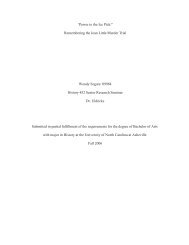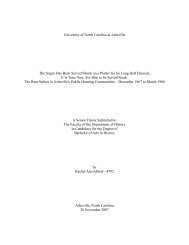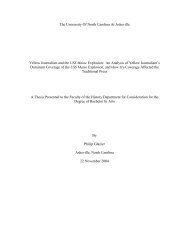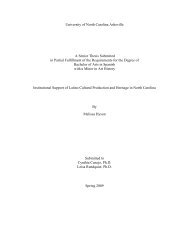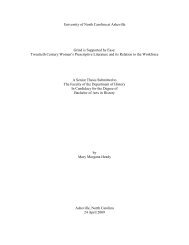Mark Twain's Writing During his Last Twenty Years: The Conflicts of ...
Mark Twain's Writing During his Last Twenty Years: The Conflicts of ...
Mark Twain's Writing During his Last Twenty Years: The Conflicts of ...
You also want an ePaper? Increase the reach of your titles
YUMPU automatically turns print PDFs into web optimized ePapers that Google loves.
Arghiere 8<br />
for one man to seize another man’s property or life if he is strong enough and<br />
wants to take it. (“<strong>Mark</strong> Twain’s Social Darwinism” 168)<br />
Denying the existence <strong>of</strong> morality does not seem to have been sufficient, by itself, to satisfy<br />
Twain’s desired ends, as it appears that he was interested in extricating himself and the human<br />
race from responsibility for regrettable or immoral acts. To make a persuasive claim against<br />
human responsibility, and to thus assuage <strong>his</strong> sense <strong>of</strong> guilt and <strong>his</strong> anger towards the human<br />
race, Twain, as editor Pascal Covici suggests, turned to a set <strong>of</strong> mechanistic beliefs: “If people are<br />
simply the result <strong>of</strong> what training or environment makes <strong>of</strong> the original raw material, as Twain’s<br />
fictions and characters come more and more to suggest and assert, then no basis for moral<br />
outrage exists” (549). Covici, however, <strong>of</strong>fers only a broad reference to Twain’s deterministic<br />
beliefs, which play an important role in much <strong>of</strong> <strong>his</strong> later writing.<br />
In <strong>his</strong> letters and in What Is Man?, Twain most clearly details the theory <strong>of</strong> determinism<br />
many believe he adopted to absolve himself and the human race <strong>of</strong> guilt. In What Is Man?,<br />
Twain outlines a theory <strong>of</strong> determinism as he writes on human nature: “Whatsoever a man is, is<br />
due to <strong>his</strong> make, and to the influences brought to bear upon it by <strong>his</strong> heredities, <strong>his</strong> habitat, <strong>his</strong><br />
associations. He is moved, directed, COMMANDED, by exterior influences—solely. He<br />
originates nothing, not even a thought” (337). Twain adds, in a 1909 letter to Howells: “I like to<br />
see my mind perform according to the law which I have laid down in ‘What Is Man’: the law<br />
that the mind works automatically, & plans & perfects many a project without its owner<br />
suspecting what it is about; the mind being merely a machine, & not in even the slightest degree<br />
under the control <strong>of</strong> its owner or subject to <strong>his</strong> influence” (“To W.D. Howells” 844). Although<br />
the mind, as Twain writes, is “merely a machine” and uncontrollable to its subject, Twain allows,<br />
in What Is Man?, for “free choice:” “<strong>The</strong> mind can freely select, choose, point out the right and just



